Joshua and Judges Lesson 1
Chris Knepp
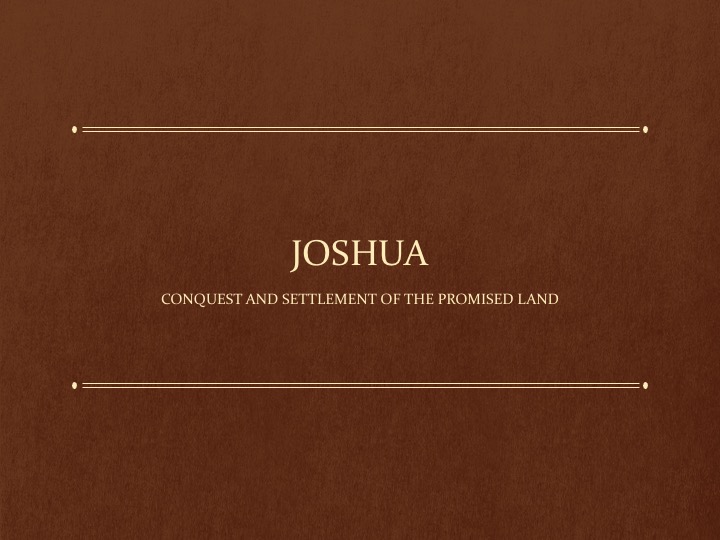
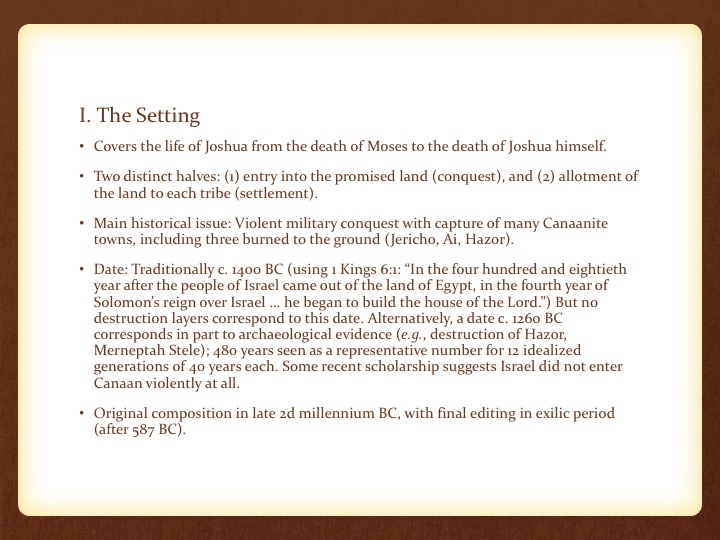
Joshua And Judges Lesson I
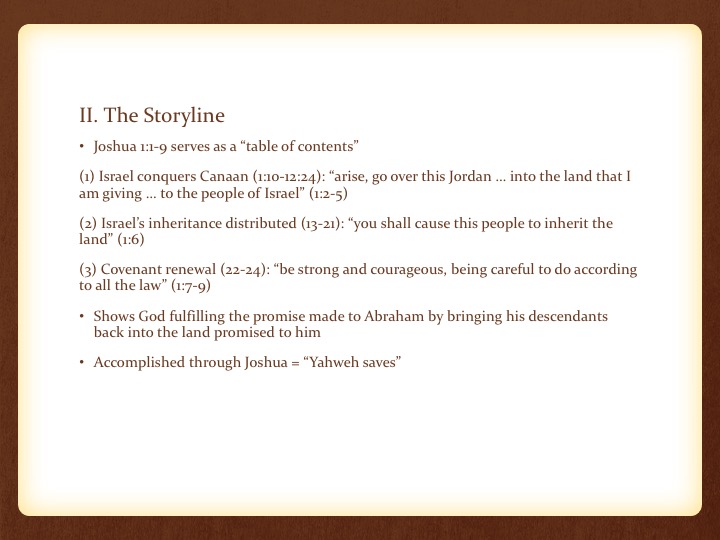
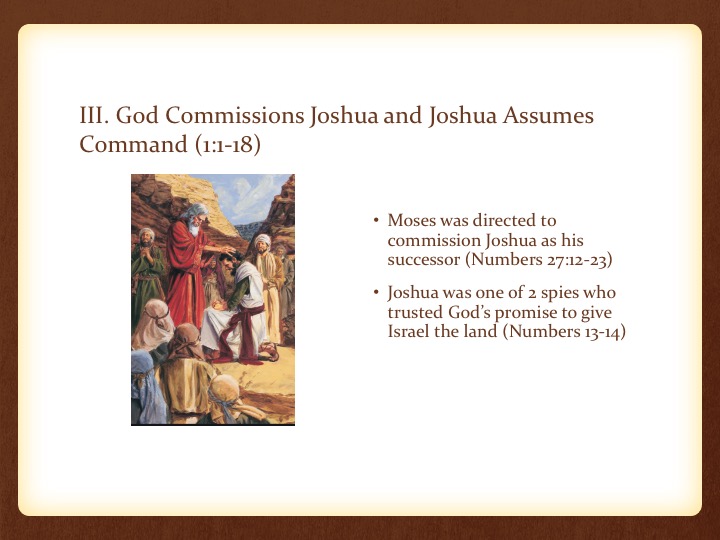
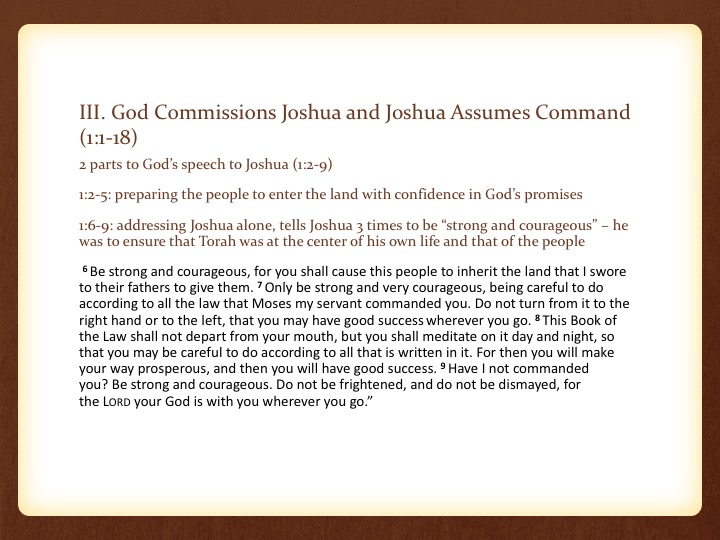
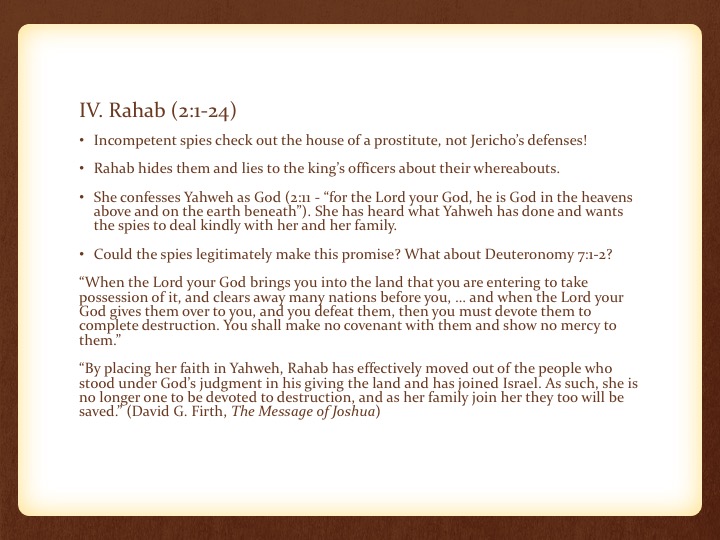
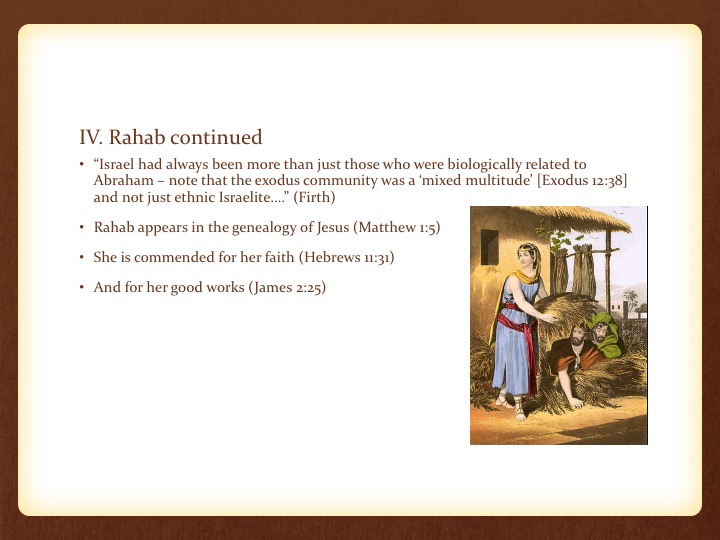
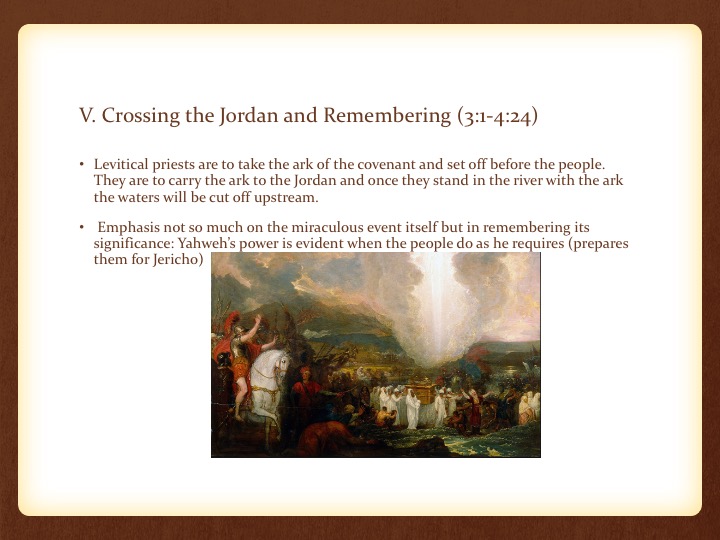
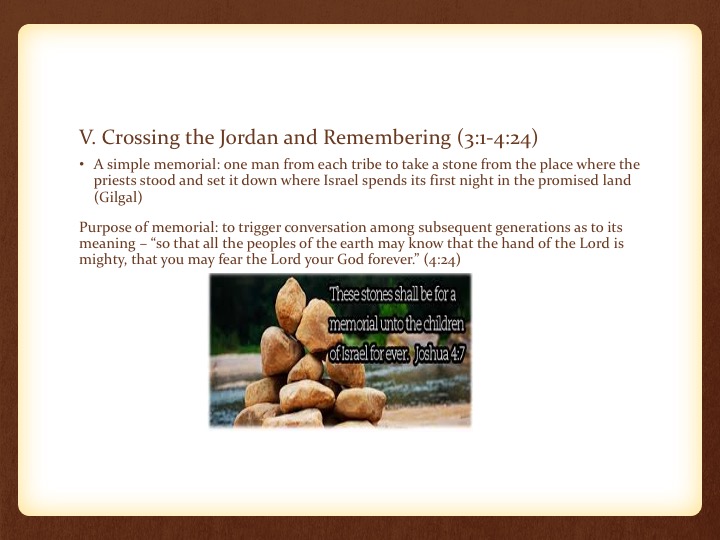
I. The Setting
Covers the life of Joshua from the death of Moses to the death of Joshua himself.
Two distinct halves: (1) entry into the promised land (conquest), and (2) allotment of the land to each tribe (settlement).
Main historical issue: Violent military conquest with capture of many Canaanite towns, including three burned to the ground (Jericho, Ai, Hazor).
Date: Traditionally c. 1400 BC (using 1 Kings 6:1: “In the four hundred and eightieth year after the people of Israel came out of the land of Egypt, in the fourth year of Solomon’s reign over Israel … he began to build the house of the Lord.”) But no destruction layers correspond to this date. Alternatively, a date c. 1260 BC corresponds in part to archaeological evidence (e.g., destruction of Hazor, Merneptah Stele); 480 years seen as a representative number for 12 idealized generations of 40 years each. Some recent scholarship suggests Israel did not enter Canaan violently at all.
Original composition in late 2d millennium BC, with final editing in exilic period (after 587 BC).
Joshua and Judges Lesson I
II. The Storyline
Joshua 1:1-9 serves as a “table of contents”
(1) Israel conquers Canaan (1:10-12:24): “arise, go over this Jordan … into the land that I am giving … to the people of Israel” (1:2-5)
(2) Israel’s inheritance distributed (13-21): “you shall cause this people to inherit the land” (1:6)
(3) Covenant renewal (22-24): “be strong and courageous, being careful to do according to all the law” (1:7-9)
Shows God fulfilling the promise made to Abraham by bringing his descendants back into the land promised to him
Accomplished through Joshua = “Yahweh saves”
III. God Commissions Joshua and Joshua Assumes Command (1:1-18)
Moses was directed to commission Joshua as his successor (Numbers 27:12-23)
Joshua was one of 2 spies who trusted God’s promise to give Israel the land (Numbers 13-14)
Joshua And Judges Lesson I
III. God Commissions Joshua and Joshua Assumes Command (1:1-18)
2 parts to God’s speech to Joshua (1:2-9)
1:2-5: preparing the people to enter the land with confidence in God’s promises
1:6-9: addressing Joshua alone, tells Joshua 3 times to be “strong and courageous” – he was to ensure that Torah was at the center of his own life and that of the people
6 Be strong and courageous, for you shall cause this people to inherit the land that I swore to their fathers to give them. 7 Only be strong and very courageous, being careful to do according to all the law that Moses my servant commanded you. Do not turn from it to the right hand or to the left, that you may have good success wherever you go. 8 This Book of the Law shall not depart from your mouth, but you shall meditate on it day and night, so that you may be careful to do according to all that is written in it. For then you will make your way prosperous, and then you will have good success. 9 Have I not commanded you? Be strong and courageous. Do not be frightened, and do not be dismayed, for the Lord your God is with you wherever you go.”
Joshua And Judges Lesson I
IV. Rahab (2:1-24)
Incompetent spies check out the house of a prostitute, not Jericho’s defenses!
Rahab hides them and lies to the king’s officers about their whereabouts.
She confesses Yahweh as God (2:11 - “for the Lord your God, he is God in the heavens above and on the earth beneath”). She has heard what Yahweh has done and wants the spies to deal kindly with her and her family.
Could the spies legitimately make this promise? What about Deuteronomy 7:1-2?
“When the Lord your God brings you into the land that you are entering to take possession of it, and clears away many nations before you, … and when the Lord your God gives them over to you, and you defeat them, then you must devote them to complete destruction. You shall make no covenant with them and show no mercy to them.”
“By placing her faith in Yahweh, Rahab has effectively moved out of the people who stood under God’s judgment in his giving the land and has joined Israel. As such, she is no longer one to be devoted to destruction, and as her family join her they too will be saved.” (David G. Firth, The Message of Joshua)
IV. Rahab continued
“Israel had always been more than just those who were biologically related to Abraham – note that the exodus community was a ‘mixed multitude’ [Exodus 12:38] and not just ethnic Israelite….” (Firth)
Rahab appears in the genealogy of Jesus (Matthew 1:5)
She is commended for her faith (Hebrews 11:31)
And for her good works (James 2:25)
Joshua And Judges Lesson I
V. Crossing the Jordan and Remembering (3:1-4:24)
Levitical priests are to take the ark of the covenant and set off before the people. They are to carry the ark to the Jordan and once they stand in the river with the ark the waters will be cut off upstream.
Emphasis not so much on the miraculous event itself but in remembering its significance: Yahweh’s power is evident when the people do as he requires (prepares them for Jericho)
V. Crossing the Jordan and Remembering (3:1-4:24)
A simple memorial: one man from each tribe to take a stone from the place where the priests stood and set it down where Israel spends its first night in the promised land (Gilgal)
Purpose of memorial: to trigger conversation among subsequent generations as to its meaning – “so that all the peoples of the earth may know that the hand of the Lord is mighty, that you may fear the Lord your God forever.” (4:24)
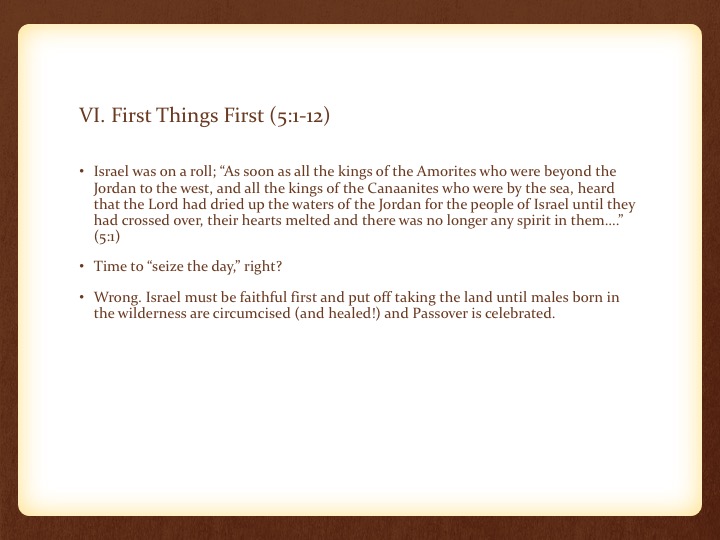
Joshua And Judges Lesson I
VI. First Things First (5:1-12)
Israel was on a roll; “As soon as all the kings of the Amorites who were beyond the Jordan to the west, and all the kings of the Canaanites who were by the sea, heard that the Lord had dried up the waters of the Jordan for the people of Israel until they had crossed over, their hearts melted and there was no longer any spirit in them….” (5:1)
Time to “seize the day,” right?
Wrong. Israel must be faithful first and put off taking the land until males born in the wilderness are circumcised (and healed!) and Passover is celebrated.
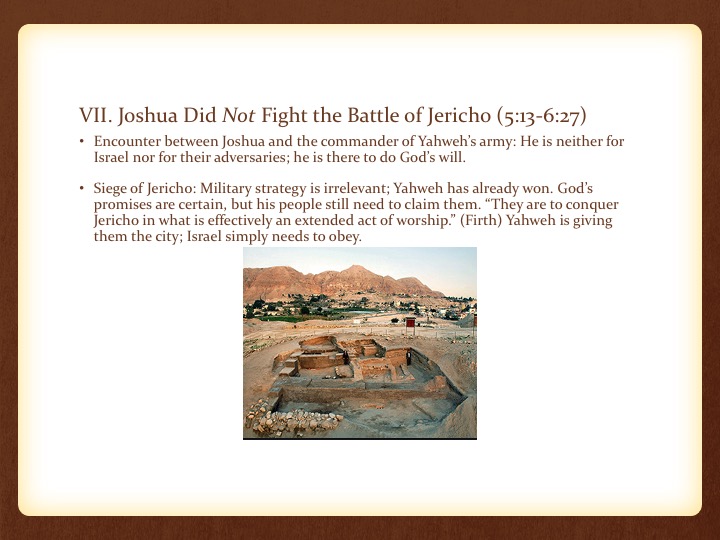
VII. Joshua Did Not Fight the Battle of Jericho (5:13-6:27)
Encounter between Joshua and the commander of Yahweh’s army: He is neither for Israel nor for their adversaries; he is there to do God’s will.
Siege of Jericho: Military strategy is irrelevant; Yahweh has already won. God’s promises are certain, but his people still need to claim them. “They are to conquer Jericho in what is effectively an extended act of worship.” (Firth) Yahweh is giving them the city; Israel simply needs to obey.
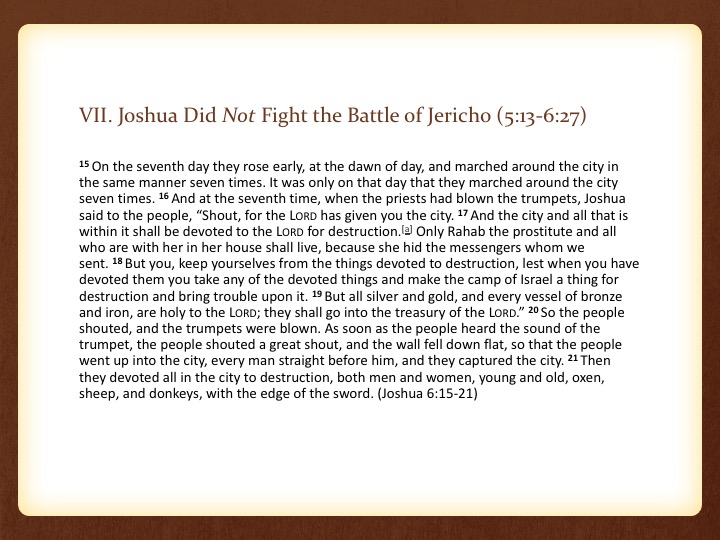
Joshua And Judges Lesson I
VII. Joshua Did Not Fight the Battle of Jericho (5:13-6:27)
15 On the seventh day they rose early, at the dawn of day, and marched around the city in the same manner seven times. It was only on that day that they marched around the city seven times. 16 And at the seventh time, when the priests had blown the trumpets, Joshua said to the people, “Shout, for the Lord has given you the city. 17 And the city and all that is within it shall be devoted to the Lord for destruction.[a] Only Rahab the prostitute and all who are with her in her house shall live, because she hid the messengers whom we sent. 18 But you, keep yourselves from the things devoted to destruction, lest when you have devoted them you take any of the devoted things and make the camp of Israel a thing for destruction and bring trouble upon it. 19 But all silver and gold, and every vessel of bronze and iron, are holy to the Lord; they shall go into the treasury of the Lord.” 20 So the people shouted, and the trumpets were blown. As soon as the people heard the sound of the trumpet, the people shouted a great shout, and the wall fell down flat, so that the people went up into the city, every man straight before him, and they captured the city. 21 Then they devoted all in the city to destruction, both men and women, young and old, oxen, sheep, and donkeys, with the edge of the sword. (Joshua 6:15-21)
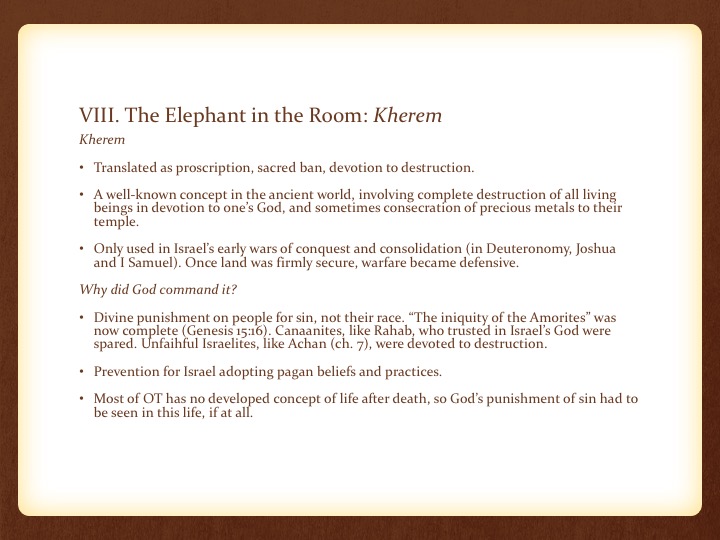
Joshua And Judges Lesson I
VIII. The Elephant in the Room: Kherem
Kherem
Translated as proscription, sacred ban, devotion to destruction.
A well-known concept in the ancient world, involving complete destruction of all living beings in devotion to one’s God, and sometimes consecration of precious metals to their temple.
Only used in Israel’s early wars of conquest and consolidation (in Deuteronomy, Joshua and I Samuel). Once land was firmly secure, warfare became defensive.
Divine punishment on people for sin, not their race. “The iniquity of the Amorites” was now complete (Genesis 15:16). Canaanites, like Rahab, who trusted in Israel’s God were spared. Unfaihful Israelites, like Achan (ch. 7), were devoted to destruction.
Prevention for Israel adopting pagan beliefs and practices.
Most of OT has no developed concept of life after death, so God’s punishment of sin had to be seen in this life, if at all.
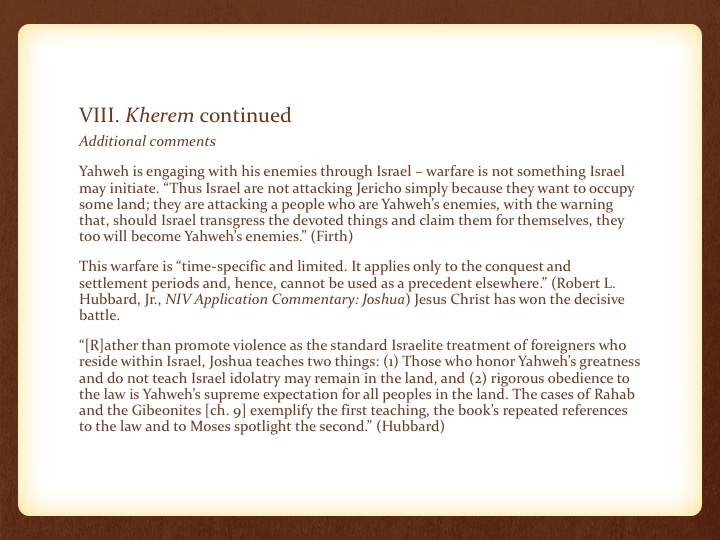
VIII. Kherem continued
Additional comments
Yahweh is engaging with his enemies through Israel – warfare is not something Israel may initiate. “Thus Israel are not attacking Jericho simply because they want to occupy some land; they are attacking a people who are Yahweh’s enemies, with the warning that, should Israel transgress the devoted things and claim them for themselves, they too will become Yahweh’s enemies.” (Firth)
This warfare is “time-specific and limited. It applies only to the conquest and settlement periods and, hence, cannot be used as a precedent elsewhere.” (Robert L. Hubbard, Jr., NIV Application Commentary: Joshua) Jesus Christ has won the decisive battle.
Rather than promote violence as the standard Israelite treatment of foreigners who reside within Israel, Joshua teaches two things: (1) Those who honor Yahweh’s greatness and do not teach Israel idolatry may remain in the land, and (2) rigorous obedience to the law is Yahweh’s supreme expectation for all peoples in the land. The cases of Rahab and the Gibeonites [ch. 9] exemplify the first teaching, the book’s repeated references to the law and to Moses spotlight the second.” (Hubbard)
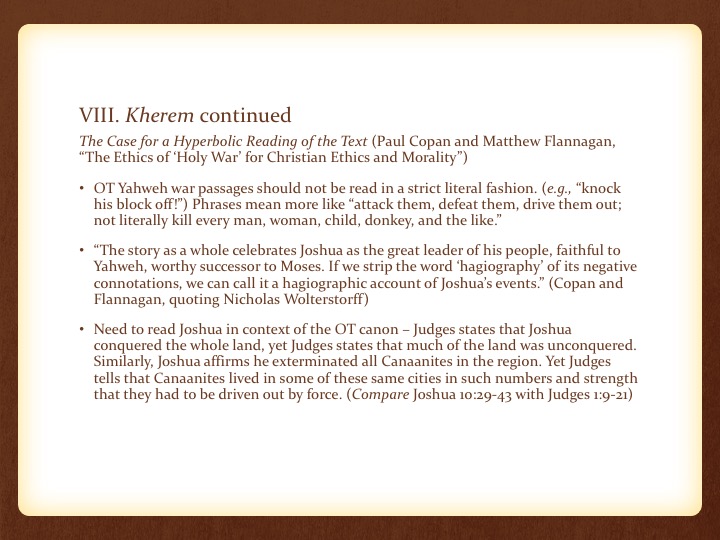
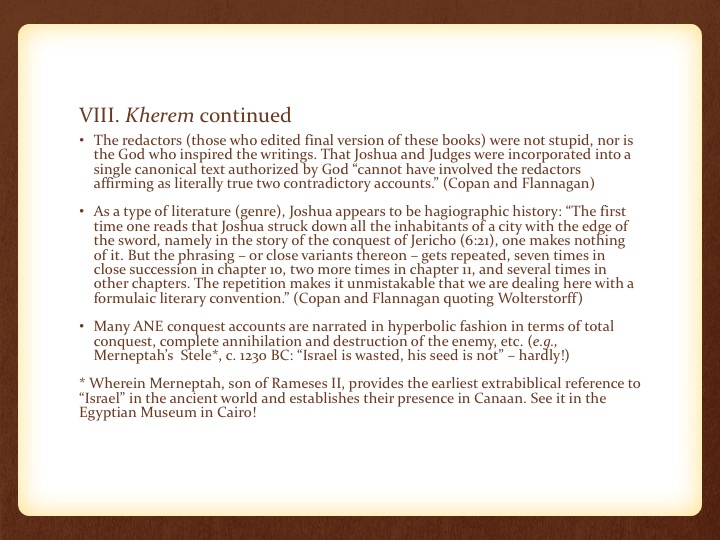
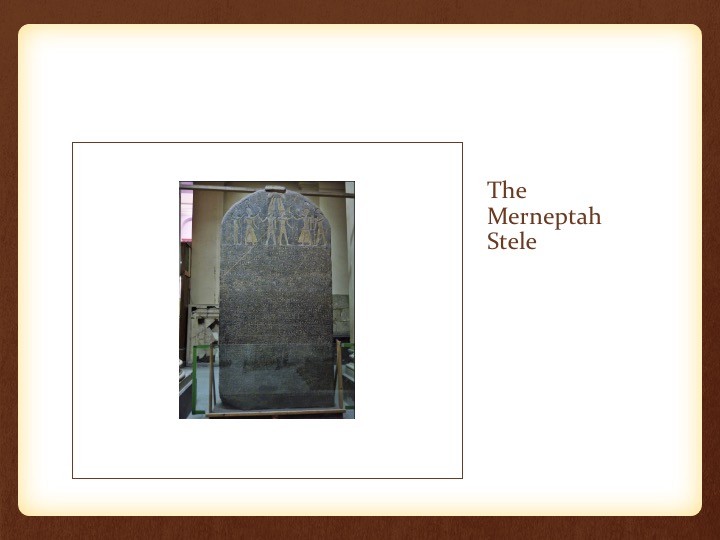
VIII. Kherem continued
The Case for a Hyperbolic Reading of the Text (Paul Copan and Matthew Flannagan, “The Ethics of ‘Holy War’ for Christian Ethics and Morality”)
OT Yahweh war passages should not be read in a strict literal fashion. (e.g., “knock his block off!”) Phrases mean more like “attack them, defeat them, drive them out; not literally kill every man, woman, child, donkey, and the like.”
“The story as a whole celebrates Joshua as the great leader of his people, faithful to Yahweh, worthy successor to Moses. If we strip the word ‘hagiography’ of its negative connotations, we can call it a hagiographic account of Joshua’s events.” (Copan and Flannagan, quoting Nicholas Wolterstorff)
Need to read Joshua in context of the OT canon – Judges states that Joshua conquered the whole land, yet Judges states that much of the land was unconquered. Similarly, Joshua affirms he exterminated all Canaanites in the region. Yet Judges tells that Canaanites lived in some of these same cities in such numbers and strength that they had to be driven out by force. (Compare Joshua 10:29-43 with Judges 1:9-21)
VIII. Kherem continued
The Case for a Hyperbolic Reading of the Text (Paul Copan and Matthew Flannagan, “The Ethics of ‘Holy War’ for Christian Ethics and Morality”)
OT Yahweh war passages should not be read in a strict literal fashion. (e.g., “knock his block off!”) Phrases mean more like “attack them, defeat them, drive them out; not literally kill every man, woman, child, donkey, and the like.”
“The story as a whole celebrates Joshua as the great leader of his people, faithful to Yahweh, worthy successor to Moses. If we strip the word ‘hagiography’ of its negative connotations, we can call it a hagiographic account of Joshua’s events.” (Copan and Flannagan, quoting Nicholas Wolterstorff)
Need to read Joshua in context of the OT canon – Judges states that Joshua conquered the whole land, yet Judges states that much of the land was unconquered. Similarly, Joshua affirms he exterminated all Canaanites in the region. Yet Judges tells that Canaanites lived in some of these same cities in such numbers and strength that they had to be driven out by force. (Compare Joshua 10:29-43 with Judges 1:9-21)